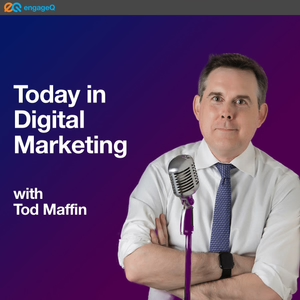
Cloud Native Observability with Martin Mao
08/31/22 • 42 min
1 Listener
Maintaining availability in a modern digital application is critical to keeping your application operating and available and to keep meeting your customers growing demands. There are many observability platforms out there and certainly Prometheus is a popular open source solution for cloud native companies yet operating an observability platform, costs money, and all of the platforms are highly data intensive.
Managing costs and data retention policies is critical to keeping your application operating healthy and operating available. Chronosphere is the leading observability platform for scaling cloud native applications. Focusing on managing costs by managing data. Martin Mao is the co-founder and CEO of Chronosphere and he is our guest today .
This episode is hosted by Lee Atchison. Lee Atchison is a software architect, author, and thought leader on cloud computing and application modernization. His most recent book, Architecting for Scale (O’Reilly Media) is an essential resource for technical teams looking to maintain high availability and manage risk in their cloud environments.
Lee is the host of his podcast, Modern Digital Business, an engaging and informative podcast produced for people looking to build and grow their digital business with the help of modern applications and processes developed for today’s fast-moving business environment. Subscribe at mdb.fm. Follow Lee, at leeatchison.com.
Sponsorship inquiries: [email protected]
The post Cloud Native Observability with Martin Mao appeared first on Software Engineering Daily.
Maintaining availability in a modern digital application is critical to keeping your application operating and available and to keep meeting your customers growing demands. There are many observability platforms out there and certainly Prometheus is a popular open source solution for cloud native companies yet operating an observability platform, costs money, and all of the platforms are highly data intensive.
Managing costs and data retention policies is critical to keeping your application operating healthy and operating available. Chronosphere is the leading observability platform for scaling cloud native applications. Focusing on managing costs by managing data. Martin Mao is the co-founder and CEO of Chronosphere and he is our guest today .
This episode is hosted by Lee Atchison. Lee Atchison is a software architect, author, and thought leader on cloud computing and application modernization. His most recent book, Architecting for Scale (O’Reilly Media) is an essential resource for technical teams looking to maintain high availability and manage risk in their cloud environments.
Lee is the host of his podcast, Modern Digital Business, an engaging and informative podcast produced for people looking to build and grow their digital business with the help of modern applications and processes developed for today’s fast-moving business environment. Subscribe at mdb.fm. Follow Lee, at leeatchison.com.
Sponsorship inquiries: [email protected]
The post Cloud Native Observability with Martin Mao appeared first on Software Engineering Daily.
Previous Episode

Developer-first Observability with Liran Haimovitch
As software engineering teams start to build products that become more and more mature, it becomes necessary to be able to debug complex issues with tooling that enables understanding of the full scenario. This can come from application scenarios where APIs are running multiple versions, where users are using your app from multiple devices, device types, OS versions, browser versions, things like that. You may also run into issues with network connectivity or a functionality that is intermittent based on sort of use cases and user interactions. And for this sort of scenario, we’ve come to start to use a class of tools for debugging called observability tools.
Observability tools help developers to understand the full scenario of an application by digging into the data that is being used and recorded. And can help to pipe data across various , solutions that are used within enterprises to read and discover what’s going on from analytics. One such tool, one product used for this is Rookout . And we are here today, chatting with Liran Haimovitch . We’ll talk a little bit about the product and his history, as well as the use case for out and sort of where the team is headed.
Sponsorship inquiries: [email protected]
The post Developer-first Observability with Liran Haimovitch appeared first on Software Engineering Daily.
Next Episode

Panther: Security as Code with Jack Naglieri
Originally published on August 23, 2021.
Application security is usually done with a set of tools and services known as SIEM – Security Information and Event Management. SIEM tools usually try to provide visibility into an organization’s security systems, as well as event log management and security event notifications.
The company Panther takes traditional SIEM security a step further. Panther processes and retains all of your security data with cloud-first workflows, identifies and alerts in real-time suspicious activity, enables building a high-fidelity alerting pipeline with Python, version control, unit tests, and CI/CD, and provides a security data lake where raw logs are structured for security at scale.
In this episode we talk with Jack Naglieri, Founder and CEO at Panther Labs.
Sponsorship inquiries: [email protected]
The post Panther: Security as Code with Jack Naglieri appeared first on Software Engineering Daily.
If you like this episode you’ll love
Episode Comments
Generate a badge
Get a badge for your website that links back to this episode
<a href="https://goodpods.com/podcasts/software-engineering-daily-40821/cloud-native-observability-with-martin-mao-23397771"> <img src="https://storage.googleapis.com/goodpods-images-bucket/badges/generic-badge-1.svg" alt="listen to cloud native observability with martin mao on goodpods" style="width: 225px" /> </a>
Copy




